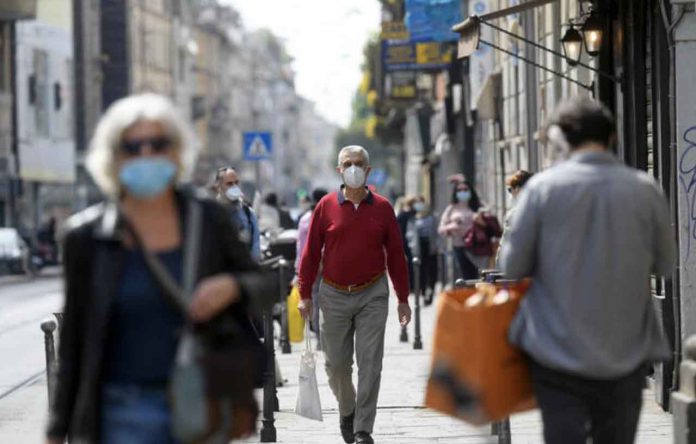
In the U.S., one in five people say they never wear a mask when leaving the house
By Anastasia Moloney
BOGOTA – (Thomson Reuters Foundation) – COVID-19 infection rates are surging in parts of the United States but Americans are much less likely to wear face masks compared with other regions like Latin America. Why?
A survey of 169,000 people in over 100 countries by U.S.-based data company Premise found widely different attitudes to mask-wearing across Europe, Asia, Africa, and the Americas. Here are the key takeaways:
Why it matters:
More research is needed to give a complete picture of the effectiveness of public mask-wearing but many medical experts say masks do prevent the transmission of respiratory droplets, which can carry the virus.
If all Americans wore a mask, the rising cases of COVID-19 could be under control within four to eight weeks, the U.S. Centers for Disease Control and Prevention said in July.
A British scientific study said population-wide face mask use could prevent further waves of the pandemic disease when combined with lockdowns.
How many Americans are wearing face masks?
Nearly one in five Americans said they never wear a mask when leaving the house, while 37% of the 7,649 people in the United States surveyed said they sometimes wear one.
That is despite 73% of Americans saying they are “concerned” or “very concerned” about the spread of COVID-19 in their community.
How does that compare to Latin America?
In the 17 countries surveyed across Latin America, only 7% of people said they never wear a mask outdoors.
In Brazil, where President Jair Bolsonaro has repeatedly downplayed the gravity of the coronavirus, 66% of people said they always wear a mask when they leave their home, while less than 9% said they never wear one.
– In Chile, Colombia, Argentina, Thailand, Indonesia, Kenya, and the Philippines more than 72% of people said they always wear a mask when they leave home.
Why aren’t more Americans wearing masks?
Around a third of respondents in the United States said they did “not believe face masks are effective for preventing the spread of COVID-19, while nearly 10% said, “I do not need a mask to protest myself and others.”
Nearly a third said masks were “uncomfortable” while 6% said, “Nobody else in my area wears a mask.”
About a quarter said they “did not own a mask or know how to make one.”
The bigger picture:
The survey reflects a lack of trust among some people of the medical advice given by governments and scientists and the belief that wearing a mask makes little difference in the fight against the pandemic.
Experts say mask-wearing in the United States has also become politicized with some Americans saying mask-wearing goes against their civil liberties and rights to decide about what they can and can’t wear.
There have also been confusing messages about mask-wearing.
U.S. President Donald Trump, who downplayed the virus in its early stages and once referred to mask-wearing as politically correct, has been reluctant to wear a face-covering himself.
In late July, in a shift rhetoric and tone, the Republican president encouraged Americans to wear masks.
What happens next?
It is expected more countries across the world will introduce laws requiring people to wear masks outdoors.
More than 20 U.S. states now have laws making it mandatory for people to wear face makes in public where more than 160,000 people have died due to COVID-19 across the country.
A key question is if attitudes towards mask-wearing can be changed to ensure more people wear masks in public to help stem the spread of COVID-19 and second waves, medical experts say.
(Reporting by Anastasia Moloney; Editing by Tom Finn. Please credit the Thomson Reuters Foundation, the charitable arm of Thomson Reuters






